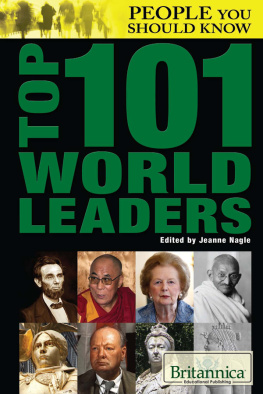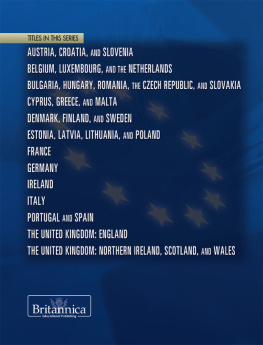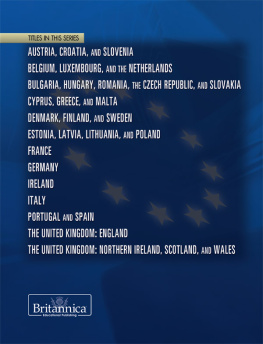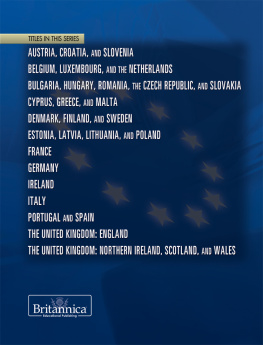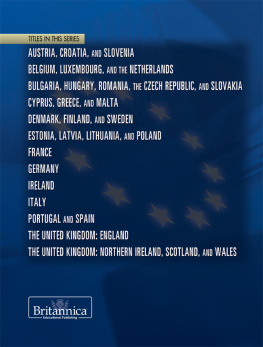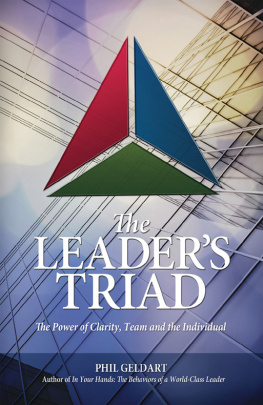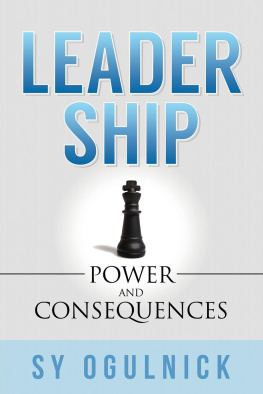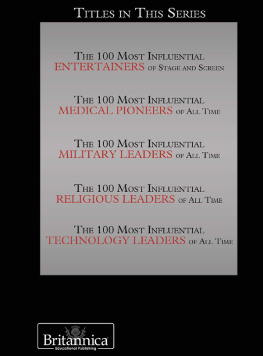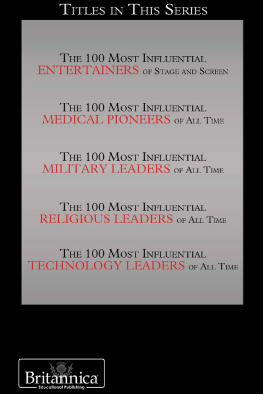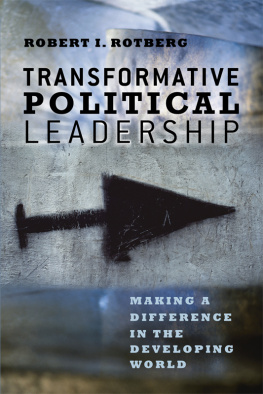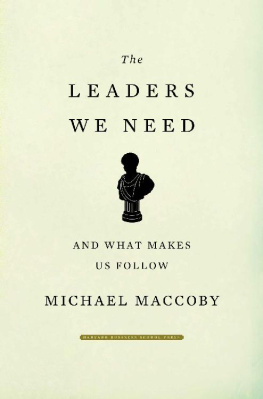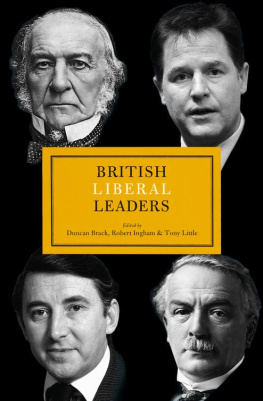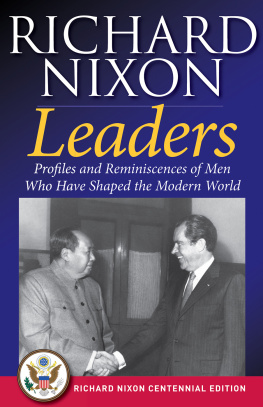
Published in 2014 by Britannica Educational Publishing (a trademark of Encyclopdia Britannica, Inc.) in association with The Rosen Publishing Group, Inc.
29 East 21st Street, New York, NY 10010
Copyright 2014 by Encyclopdia Britannica, Inc. Britannica, Encyclopdia Britannica, and the Thistle logo are registered trademarks of Encyclopdia Britannica, Inc. All rights reserved.
Rosen Publishing materials copyright 2014 The Rosen Publishing Group, Inc. All rights reserved.
Distributed exclusively by Rosen Publishing.
To see additional Britannica Educational Publishing titles, go to rosenpublishing.com.
First Edition
Britannica Educational Publishing
J.E. Luebering: Director, Core Reference Group
Anthony L. Green: Editor, Comptons by Britannica
Rosen Publishing
Hope Lourie Killcoyne: Executive Editor
Jeanne Nagle: Editor
Nelson S: Art Director
Brian Garvey: Designer, Cover Design
Cindy Reiman: Photography Manager
Library of Congress Cataloging-in-Publication Data
Top 101 world leaders/editor, Jeanne Nagle. First edition.
pages cm. (People you should know)
Includes bibliographical references and index.
ISBN 978-1-62275-125-9 (eBook)
1. Heads of stateBiographyJuvenile literature. 2. StatesmenBiographyJuvenile
literature. I. Nagle, Jeanne. II. Title: Top one hundred one world leaders.
D107.T67 2014
352.230922dc23
[B]
2013033316
On the cover: Pictured are (top, left to right) Abraham Lincoln thatsmymop/ Shutterstock.com; the Dalai Lama ocphoto/Shutterstock.com; Margaret Thatcher WPA Pool/Getty Images; Mohandas Gandhi Elliot & Fry/Hulton Archive/Getty Images; (bottom, left to right) Catherine II Fine Art Images/SuperStock; Winston Churchill Michael Ochs Archives/Getty Images; Queen Victoria Abraham Badenhorst/ Shutterstock.com; and Cleopatra Time & Life Pictures/Getty Images.
Cover and interior pages (top) iStockphoto.com/Ren Mansi
CONTENTS
I f history is any indication, most of todays political and governmental leaders will largely be forgotten in a decade or two. Over time, the contributions of many world leaders begin to fade in importance as new ideas and individuals capture the publics attention. However, the reputations of a select few will not only endure beyond their lifetimes but will start to grow in importance, gaining recognition far beyond their time and place. People You Should Know: Top 101 World Leaders is a collection of biographies of many of the latter group, along with a sampling of significant contemporary leaders.
There are two defining characteristics of great leaders. First, they have been people of action whose fame, ideas, and breadth of accomplishment endure over time. Victorious emperors such as Julius Caesar of Rome and Napoleon I of France typically exhibit these qualities, combining impressive military conquests with major social, economic, and political reforms. American President Abraham Lincoln and South African President Nelson Mandela are known for their civil rights accomplishments as well as for the wisdom and mercy that each used to heal and unify his divided nation. The world also pays attention to and admires leaders who succeed by overcoming great obstacles. Female leaders such as Englands Elizabeth I and Russias Catherine the Great had to tread carefully because of their gender, but each significantly contributed to the progress and prosperity of her nation.
The second defining characteristic of world leaders is their ability to exert tremendous influence and inspire confidence and loyalty. Indeed, all great world leaders have attracted and maintained legions of disciples who believed in and promoted their ideas. Some, such as Britains Winston Churchill, connected to the people through soaring rhetoricmeaning he motivated and inspired people through exceptional public speakingand devotion to duty. Others, such as Chinas Mao Zedong and Polands Lech Wasa, attracted loyal followers by becoming the voice and champion of the common man.
Merely because a world leader possesses these traits does not mean his or her leadership has been good or beneficial for society. Germanys Adolf Hitler, the Soviet Unions Joseph Stalin, and Cambodias Pol Pot were skilled and seemingly popular leaders who inspired followers but who were also guilty of committing great and terrible brutality against millions of their own citizens. Clearly, in cases such as these, great does not always mean good. What it does mean is that these great leaders were so highly influential that they changed not only their own societies but left a lasting legacy that impacted the future of the entire world.
(b. 1956 )
D espite his service as mayor of the capital city of Tehran, Iranian Mahmoud Ahmadinejad was largely considered a political outsider when he announced his candidacy for president. Through a massive nationwide mobilization of supporters and with the support of hard-line conservatives, however, he won the presidency of Iran in 2005.
Ahmadinejad was born on Oct. 28, 1956, in Garmsar, Iran. The son of a blacksmith, he grew up in Tehran and studied to be an engineer at Iran University of Science and Technology, where he was a student leader during the Iranian Revolution. After the revolution, like many of his peers, he joined the Revolutionary Guards, a religious militia group formed by Ayatollah Ruhollah Khomeini. He continued his studies at IUST, eventually earning a doctorate in transportation engineering and planning.
In May 2003, Ahmadinejad was chosen to serve as mayor of Tehran. In that capacity he was credited with solving traffic problems and keeping prices down. As president, he initially focused on issues such as poverty and social justice. He generally took a more conservative approach domestically, in 2005 prohibiting state television and radio stations from broadcasting music considered indecent, though under his leadership women symbolically were allowed for the first time since the revolution into major sporting events.
Ahmadinejad was very active in foreign affairs, strongly defending Irans nuclear program against international criticism. Irans nuclear efforts and Ahmadinejads provocative foreign policy generated conflict as his term progressed. In September 2007, Ahmadinejadin New York City to address the United Nations General Assemblysparked considerable controversy in a speech given at Columbia University in which he suggested the need for further research on the Holocaust and denied the presence of any homosexual individuals in Iran.
Domestically, Ahmadinejads economic policies also proved to be a trouble spot and became an important campaign issue leading up to the 2009 presidential elections. Election officials indicated that Ahmadinejad won in 2009 with more than 60 percent of the vote. His chief opposition, Mir Hossein Mousavi, and Mousavis supporters protested the results, claiming electoral irregularities. Demonstrations took place in the capital and elsewhere.
In April 2011 a conflict arose between Ahmadinejad and Irans supreme leader, Ayatollah Ali Khamenei, over the dismissal of Irans minister of intelligence. Ahmadinejad soon found himself facing increased opposition and criticism. The almost unheard of questioning of a president by the Majles (Irans legislative body) in 2012 was widely considered to be a signal of Ahmadinejads lessening political status. Nonetheless, he successfully completed his second term as president, which ended on Aug. 3, 2013.

